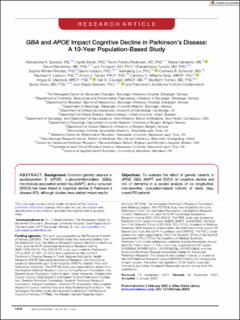GBA and APOE Impact Cognitive Decline in Parkinson's Disease: A 10-Year Population-Based Study
| dc.contributor.author | Szwedo, Aleksandra Anna | |
| dc.contributor.author | Dalen, Ingvild | |
| dc.contributor.author | Pedersen, Kenn Freddy | |
| dc.contributor.author | Camacho, Marta | |
| dc.contributor.author | Bäckström, David | |
| dc.contributor.author | Forsgren, Lars | |
| dc.contributor.author | Tzoulis, Charalampos | |
| dc.contributor.author | Winder-Rhodes, Sophie | |
| dc.contributor.author | Hudson, Gavin | |
| dc.contributor.author | Liu, Ganqiang | |
| dc.contributor.author | Scherzer, Clemens R. | |
| dc.contributor.author | Lawson, Rachael A. | |
| dc.contributor.author | Yarnall, Alison J. | |
| dc.contributor.author | Williams-Gray, Caroline H. | |
| dc.contributor.author | Macleod, Angus D. | |
| dc.contributor.author | Counsell, Carl E. | |
| dc.contributor.author | Tysnes, Ole-Bjørn | |
| dc.contributor.author | Alves, Guido Werner | |
| dc.contributor.author | Maple-Grødem, Jodi | |
| dc.date.accessioned | 2022-10-19T09:47:55Z | |
| dc.date.available | 2022-10-19T09:47:55Z | |
| dc.date.created | 2022-10-06T13:00:47Z | |
| dc.date.issued | 2022 | |
| dc.identifier.issn | 0885-3185 | |
| dc.identifier.uri | https://hdl.handle.net/11250/3027002 | |
| dc.description.abstract | Background: Common genetic variance in apolipoprotein E (APOE), β-glucocerebrosidase (GBA), microtubule-associated protein tau (MAPT), and α-synuclein (SNCA) has been linked to cognitive decline in Parkinson's disease (PD), although studies have yielded mixed results. Objectives: To evaluate the effect of genetic variants in APOE, GBA, MAPT, and SNCA on cognitive decline and risk of dementia in a pooled analysis of six longitudinal, non-selective, population-based cohorts of newly diagnosed PD patients. Methods: 1002 PD patients, followed for up to 10 years (median 7.2 years), were genotyped for at least one of APOE-ε4, GBA mutations, MAPT H1/H2, or SNCA rs356219. We evaluated the effect of genotype on the rate of cognitive decline (Mini-Mental State Examanation, MMSE) using linear mixed models and the development of dementia (diagnosed using standardized criteria) using Cox regression; multiple comparisons were accounted for using Benjamini−Hochberg corrections. Results: Carriers of APOE-ε4 (n = 281, 29.7%) and GBA mutations (n = 100, 10.3%) had faster cognitive decline and were at higher risk of progression to dementia (APOE-ε4, HR 3.57, P < 0.001; GBA mutations, HR 1.76, P = 0.001) than non-carriers. The risk of cognitive decline and dementia (HR 5.19, P < 0.001) was further increased in carriers of both risk genotypes (n = 23). No significant effects were observed for MAPT or SNCA rs356219. Conclusions: GBA and APOE genotyping could improve the prediction of cognitive decline in PD, which is important to inform the clinical trial selection and potentially to enable personalized treatment | en_US |
| dc.language.iso | eng | en_US |
| dc.publisher | Wiley | en_US |
| dc.rights | Navngivelse 4.0 Internasjonal | * |
| dc.rights.uri | http://creativecommons.org/licenses/by/4.0/deed.no | * |
| dc.title | GBA and APOE Impact Cognitive Decline in Parkinson's Disease: A 10-Year Population-Based Study | en_US |
| dc.type | Journal article | en_US |
| dc.type | Peer reviewed | en_US |
| dc.description.version | publishedVersion | en_US |
| dc.rights.holder | Copyright 2022 the authors | en_US |
| cristin.ispublished | true | |
| cristin.fulltext | original | |
| cristin.qualitycode | 1 | |
| dc.identifier.doi | 10.1002/mds.28932 | |
| dc.identifier.cristin | 2059167 | |
| dc.source.journal | Movement Disorders | en_US |
| dc.source.pagenumber | 1016-1027 | en_US |
| dc.identifier.citation | Movement Disorders. 2022, 37 (5), 1016-1027. | en_US |
| dc.source.volume | 37 | en_US |
| dc.source.issue | 5 | en_US |
Files in this item
This item appears in the following Collection(s)
-
Department of Clinical Medicine [2059]
-
Registrations from Cristin [9696]

